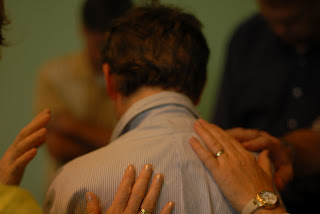Revival—Nehemiah Style
The walls are up and people are settled in. Nehemiah calls a general assembly "…made up of men and women and all who were able to understand" (Nehemiah 8:2, NIV) and Ezra, the teacher of the law, enters the picture once again.
Ezra begins to read the Law of Moses. From daybreak until noon he reads. And everyone listens. They worship. "They read from the Book of the Law of God, making it clear and giving the meaning so that the people understood what was being read" (8:8, NIV).
Here, in just a few statements, is the essence of the ministry: Assemble, worship, read and understand the Scriptures.
This moment in history kicked off days of celebration in Jerusalem. But it is interesting to note that Nehemiah had to order the people to celebrate because when they heard the Word of the Lord read the reaction was not one of joy. "…all the people had been weeping as they listened to the words of the Law" (8:9, NIV). No explanation is given except to say that they wept in grief (8:9, 10, 11), no doubt moved by how far they, and their ancestors, had strayed from God's design for them.
But they found strength in the Lord and celebrated (8:10). For seven days they listened to the Word of God being read and then, on the eighth day, the grief that they had expressed at the first reading resulted in an assembly of mass repentance, described for us in Nehemiah 9:2, 3 (NIV): "They stood in their places and confessed their sins and the sins of their ancestors. They stood where they were and read from the Book of the Law of the Lord their God for a quarter of the day, and spent another quarter in confession and in worshiping the Lord their God."
If you are looking for a summary of the history of God's dealings with Israel, it's here in Nehemiah 9:5b-37.
At the end of this extraordinary encounter with God, the Jews renew their vows to follow God. It is interesting to note the specific promises they make:
1. Not to intermarry with unbelievers (10:30).
2. To keep the Sabbath holy by not doing business on that day (10:31).
3. To tithe, including giving members of their own families for the service of the Lord (10:32-39) "We will not neglect the house of our God" (10:39, NIV).
I find this whole process incredible. I compare Nehemiah's experience with the style and habits of the 21st century church and wonder what would happen if we called a similar kind of assembly together today.
I think it's called revival and I'd sure like to be part of one.
Ezra begins to read the Law of Moses. From daybreak until noon he reads. And everyone listens. They worship. "They read from the Book of the Law of God, making it clear and giving the meaning so that the people understood what was being read" (8:8, NIV).
Here, in just a few statements, is the essence of the ministry: Assemble, worship, read and understand the Scriptures.
This moment in history kicked off days of celebration in Jerusalem. But it is interesting to note that Nehemiah had to order the people to celebrate because when they heard the Word of the Lord read the reaction was not one of joy. "…all the people had been weeping as they listened to the words of the Law" (8:9, NIV). No explanation is given except to say that they wept in grief (8:9, 10, 11), no doubt moved by how far they, and their ancestors, had strayed from God's design for them.
But they found strength in the Lord and celebrated (8:10). For seven days they listened to the Word of God being read and then, on the eighth day, the grief that they had expressed at the first reading resulted in an assembly of mass repentance, described for us in Nehemiah 9:2, 3 (NIV): "They stood in their places and confessed their sins and the sins of their ancestors. They stood where they were and read from the Book of the Law of the Lord their God for a quarter of the day, and spent another quarter in confession and in worshiping the Lord their God."
If you are looking for a summary of the history of God's dealings with Israel, it's here in Nehemiah 9:5b-37.
At the end of this extraordinary encounter with God, the Jews renew their vows to follow God. It is interesting to note the specific promises they make:
1. Not to intermarry with unbelievers (10:30).
2. To keep the Sabbath holy by not doing business on that day (10:31).
3. To tithe, including giving members of their own families for the service of the Lord (10:32-39) "We will not neglect the house of our God" (10:39, NIV).
I find this whole process incredible. I compare Nehemiah's experience with the style and habits of the 21st century church and wonder what would happen if we called a similar kind of assembly together today.
I think it's called revival and I'd sure like to be part of one.




Comments
Post a Comment